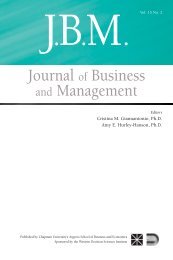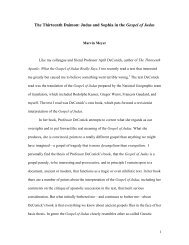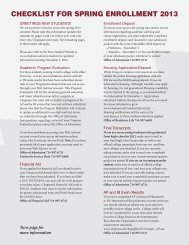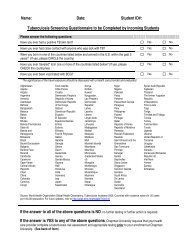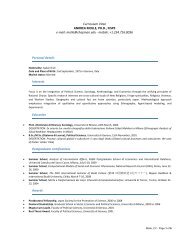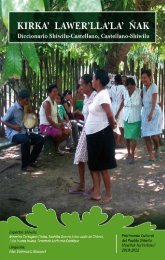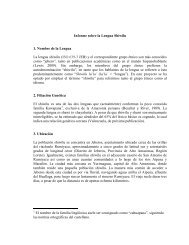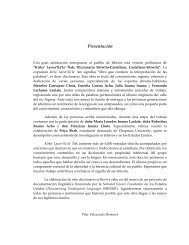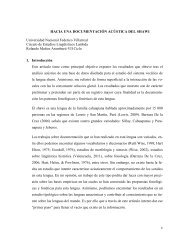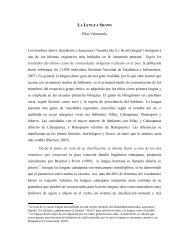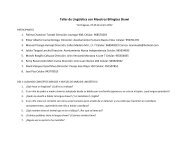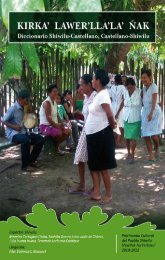“Surplus Humanity” and the Margins of Legality - Chapman University
“Surplus Humanity” and the Margins of Legality - Chapman University
“Surplus Humanity” and the Margins of Legality - Chapman University
You also want an ePaper? Increase the reach of your titles
YUMPU automatically turns print PDFs into web optimized ePapers that Google loves.
Do Not Delete 12/12/2010 7:34 PM<br />
22 <strong>Chapman</strong> Law Review [Vol. 14:1<br />
regimes, with <strong>the</strong>ir bedrock principles <strong>of</strong> private property rights<br />
<strong>and</strong> free trade, are a coercive mechanism to get states in <strong>the</strong><br />
global South to adopt neoliberal economic <strong>and</strong> social policy<br />
frames conducive to global capital. 136 The enabling mechanism is<br />
―[t]he extension <strong>of</strong> <strong>the</strong> normative force <strong>of</strong> international st<strong>and</strong>ards<br />
by <strong>the</strong> device <strong>of</strong> conditionality.‖ 137 These regimes advance<br />
particular underst<strong>and</strong>ings <strong>of</strong> development <strong>and</strong> poverty that<br />
―disregard[] <strong>the</strong> social context <strong>of</strong> provision, <strong>the</strong> lived experiences<br />
<strong>of</strong> <strong>the</strong> poor <strong>and</strong> dismiss[] <strong>and</strong>/or reinforce[] <strong>the</strong> way in which<br />
deprivations are constituted.‖ 138 The m<strong>and</strong>ate is to privatize<br />
public assets, roll back social services, <strong>and</strong> allow unbridled<br />
mobility <strong>of</strong> capital. 139 Now ―[s]trait-jacketed within <strong>the</strong> global<br />
logic <strong>of</strong> capital <strong>and</strong> market <strong>and</strong> <strong>the</strong> global regime <strong>of</strong> property<br />
rights,‖ states in <strong>the</strong> global South ―can no longer act as<br />
developmental states <strong>and</strong> engage in management <strong>of</strong> poverty on<br />
<strong>the</strong>ir own.‖ 140 Instead, non-state actors representing interests <strong>of</strong><br />
global capital play an active role in designing legal orders that<br />
circumscribe state sovereignty <strong>and</strong> autonomy. 141 M<strong>and</strong>ates <strong>of</strong><br />
privatization make education, health, infrastructure, utilities,<br />
housing, <strong>and</strong> a range <strong>of</strong> state enterprises available for private<br />
appropriation. 142 By its insistence on <strong>the</strong> rollback <strong>of</strong> <strong>the</strong> state,<br />
136 These regimes include <strong>the</strong> WTO multilateral agreements including <strong>the</strong> Agreement<br />
on Trade Related Intellectual Property Rights (TRIPS), <strong>the</strong> Agreement on Trade Related<br />
Investment Measures (TRIMS), <strong>the</strong> General Agreement on Trade in Services (GATS), <strong>the</strong><br />
Agreement establishing <strong>the</strong> Multilateral Investment Guarantee Agency (MIGA), <strong>and</strong><br />
bilateral investment protection treaties (BITS). Toge<strong>the</strong>r <strong>the</strong>se regimes provide global<br />
capital ease <strong>of</strong> entry <strong>and</strong> investment, protection from national performance requirements,<br />
protection <strong>of</strong> expansive intellectual property rights, generous compensation in case <strong>of</strong><br />
expropriation, insurance against non-economic risks, <strong>and</strong> mechanisms to avoid national<br />
laws <strong>and</strong> dispute resolution fora. See Chimni, WTO <strong>and</strong> Environment, supra note 133, at<br />
138.<br />
137 Vaughan Lowe, The Politics <strong>of</strong> Law-Making: Are <strong>the</strong> Method <strong>and</strong> Character <strong>of</strong><br />
Norm Creation Changing?, in THE ROLE OF LAW IN INTERNATIONAL POLITICS: ESSAYS IN<br />
INTERNATIONAL RELATIONS AND INTERNATIONAL LAW 207, 212 (Michael Byers ed., 2000).<br />
138 Richard Higgott & Heloise Weber, GATS in Context: Development, an Evolving lex<br />
marcatoria <strong>and</strong> <strong>the</strong> Doha Agenda, 12 REV. INT‘L POL. ECON. 435, 436 (2005).<br />
139 For a detailed account <strong>of</strong> how <strong>the</strong> interests <strong>of</strong> <strong>the</strong> global South are jeopardized by<br />
concentration <strong>of</strong> finance capital <strong>and</strong> monetary regimes <strong>of</strong> <strong>the</strong> IMF, see JOSEPH E.<br />
STIGLITZ, GLOBALIZATION AND ITS DISCONTENTS 89–104 (2003).<br />
140 SANYAL, supra note 77, at 77.<br />
141 See generally GLOBAL LAW WITHOUT A STATE xiv–xv (Gun<strong>the</strong>r Teubner ed., 1997).<br />
The exponential expansion <strong>of</strong> international commercial arbitration has created a space for<br />
private justice to serve global capital at <strong>the</strong> expense <strong>of</strong> <strong>the</strong> state. See Buxbaum, supra<br />
note 133, at 938–39.<br />
142 GLOBAL LAW WITHOUT A STATE, supra note 141, at 147–49, 159–60. See also<br />
David A. McDonald, Environmental Racism <strong>and</strong> Neoliberal Disorder in South Africa, in<br />
THE QUEST FOR ENVIRONMENTAL JUSTICE: HUMAN RIGHTS AND THE POLITICS OF<br />
POLLUTION 255, 270–74 (Robert D. Bullard ed., 2005); Daniel R. Faber & Deborah<br />
McCarthy, Neo-liberalism, Globalization <strong>and</strong> <strong>the</strong> Struggle for Ecological Democracy:<br />
Linking Sustainability <strong>and</strong> Environmental Justice, in JUST SUSTAINABILITIES:<br />
DEVELOPMENT IN AN UNEQUAL WORLD 38, 40, 51 (Julian Agyeman et al. eds., 2003).



